英语专业【词汇学】课件:III. classification of words
Lecture 3 Classification and development of English vocabulary
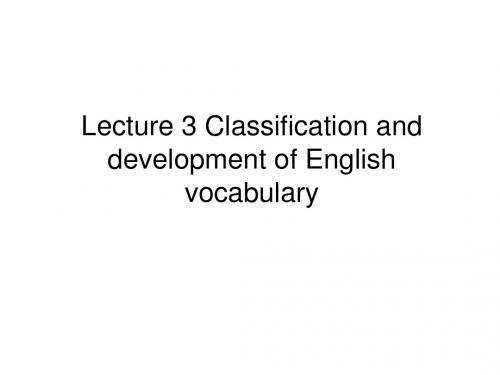
• Words taken over from foreign languages are known as borrowed words, loan words or just borrowings in simple terms. • English is a heavy borrower and has adopted words from all other major languages of the world. • It is estimated that English borrowings constitute 80% of the modern English vocabulary.
2.Content words and functional words
• By notion, words can be categorized into content words and functional ones (or empty words). • Content words: n, v, adj, adv, numerals. Functional words: prep, conj, aux, art. • Functional words, small in number, but do far more work of expression.
e.g 1) I went into this problem with my eyes open. 2) The appointment of a woman was one in the eye for male domination. 3) Up to his eyes Sir Rechard was in love with her. 4) A neighbor’s estate, mortgaged up to the eyes, was sold under the hammer. 5) You are the apple in my eye! 6) She would give her eyes to go with you. 7) Governments turn a blind eye to thousands of poverty-stricken families. 8) At sea, he often lies in the eyes of her. 9) the eye of rope… 10) in the eye of law…
英语词类 classification of English words

Micro blog 微博
Flesh search 人肉搜索
Second kill 秒杀 House-husband 家庭主男
Nanotechnology
Tour pal 驴友 BRICS 金砖五国
纳米技术
Closed-class words: membership is comparatively limited, such as pronouns, conjunctions, prepositions. For example, there are about 286 prepositions in English vocabulary, and the number has little possibility of changing.
stand up 站起来 speed up 加速 write down 写下 pour down 倾盆而下 carry on 坚持 take off 脱掉 knock over 撞倒
noun
verb adjective adverb numeral
名词
动词 形容词 副词 数词
pro-form
preposition
Classification of words by origin
Native words & Loan words Native words (本族词) are words of AngloSaxon origin or of Old English. Loan words or borrowed words are words borrowed from other languages.
代词
介词
汉 英 词 类 对 比
Week-2-classification-of-English-vocabularyPPT课件
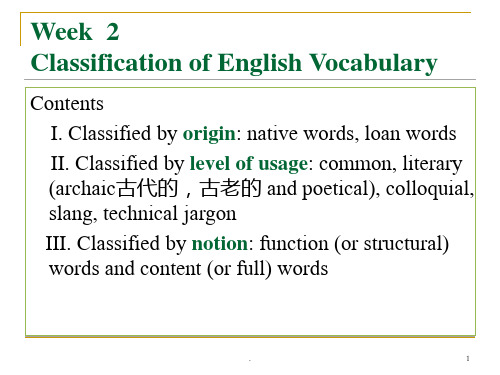
Week 2 Classification of English Vocabulary
Contents I. Classified by origin: native words, loan words II. Classified by level of usage: common, literary (archaic古代的,古老的 and poetical), colloquial, slang, technical jargon III. Classified by notion: function (or structural) words and content (or full) words
9. Active in collocation, e.g. at first hand; hand in hand (Nearly 90 set phrases with ‘hand’ in them are found in a dictionary.)
08词汇学week 2 Classification of English lary
Other words: aught (anything), betwixt (between), naught (nothing), main (mainland), vale (valley), yon (over there)
08词汇学week 2 Classification of English vocab.ulary
Lecture 3 Classification of Words
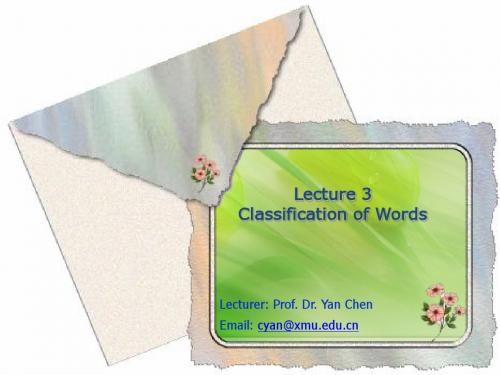
• Band 3. ◆◆◆◇◇approximately 1500 words, including words such as aggressive, medicine, and tactic. • Band 4. ◆◆◇◇◇approximately 3200 words, including words such as accuracy, duration, miserable, puzzle, and rope. • Band 5. ◆◇◇◇◇approximately 8100 words, including words such as abundant, crossroads, fearless, and missionary. The words in the top two bands account for approximately 75% of all English usage. The words in the 5 bands make up 95% of all spoken and written English.
Basic words: semantically the most frequently used words that are essential to life
• • • • • • names of natural phenomena, e.g. sun, moon, rain, words defining time and space, e.g. night, here, names of animals and plants, e.g. dog, tree, flower, names of parts of the body, e.g. head, hand, foot, adjectives denoting size and colour, e.g. big, red, verbs expressing concrete actions, e.g. live, eat, work, and • others denoting the most fundamental things of life
Classification of words
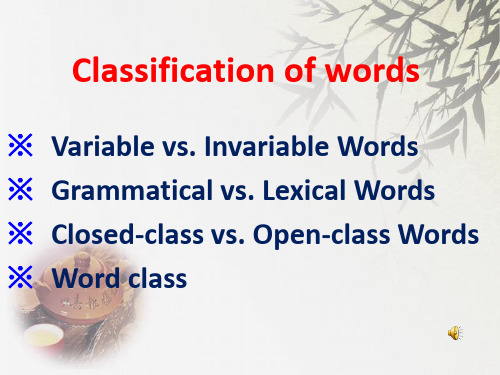
※ ※ ※ ※ Variable vs. Invariable Words Grammatical vs. Lexical Words Closed-class vs. Open-class Words Word class
Variable vs. Invariable Words:
Grammatical vs. Lexical Words
语法词) ※ Grammatical(语法词)/Function words: : express grammatical meanings, such as conjunctions连词 连词, 连词 prepositions介词 articles冠词 pronouns代词 介词, 冠词, 代词. 介词 冠词 代词 词汇词) ※ Lexical(词汇词)/Content words: have lexical meanings, those which refer to substance, action and quality, such as nouns, verbs, adjectives, adverbs. ---The lexical words carry the main content of a language (content words) and the grammatical words serve to link the different parts of a sentence together (function words).
Closed-class vs. Open-class Words
封闭类词和开放类词
※ Closed-class words is whose membership is fixed or limited. New members cannot normally be added, eg pronouns, prepositions, conjunctions, articles and others. ※ Open-class words is whose membership is in principle infinite or unlimited. New members can be added, eg nouns, verbs, adjectives, and adverbs.
英文专业词汇学考试复习资料---精品管理资料
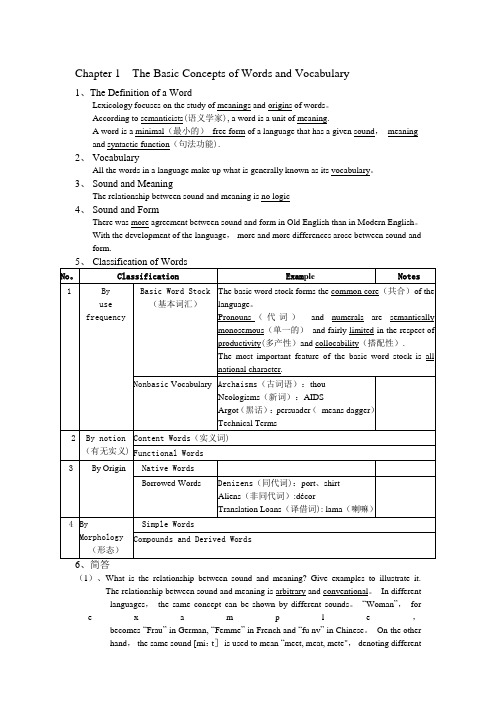
Chapter 1 The Basic Concepts of Words and Vocabulary1、The Definition of a WordLexicology focuses on the study of meanings and origins of words。
According to semanticists(语义学家), a word is a unit of meaning.A word is a minimal(最小的)free form of a language that has a given sound,meaningand syntactic function(句法功能).2、 VocabularyAll the words in a language make up what is generally known as its vocabulary。
3、 Sound and MeaningThe relationship between sound and meaning is no logic4、 Sound and FormThere was more agreement between sound and form in Old English than in Modern English。
With the development of the language,more and more differences arose between sound and form.(1)、What is the relationship between sound and meaning? Give examples to illustrate it.The relationship between sound and meaning is arbitrary and conventional。
英语专业【词汇学】课件:III. classification of words
smoke eater 消防员 clock watcher 磨洋工的人 Let‟s hit the road. 我们出发吧.
Bottle-man: drunkard
Semi-detached → 与他屋一侧相连的(房舍)→ 与妻子分居而未离婚的男子
oomph: 喘气的拟声词,‘秀色迷人、性感’、精力、热 情 Marilyn Monroe had lots of oomph. 玛丽莲· 梦露十分性感迷人。 It’s not a bad song, but it needs more oomph. ……但尚需更多的热情。
6) literary words:
words mainly used in writing, especially in books written in a more elevated style, in official documents, or in formal speeches.
Tomato→ a beautiful girl Chicken→ coward nut, dome, upper→ head merry, comfortable, boiled→ drunk cancer stick 香烟
The tube 1. (Am.E) 电视 2. ( Austr. E) 一瓶/罐啤酒 3. 香烟 4. v.i (Am.E) 做得很差
Obvious Characteristics: 1)All National Words of the basic word stock belong to people as a whole, not to a limited group, a certain region or a certain profession.
英语词汇学之Classifications of Word 词的分类(中英对照)
Classifications of Wordnon-basic vocabularyWords that do not have the stated characteristics belong to non-basic vocabulary of the language. They include the following:(1) Terminology consists of technical terms used in particular disciplines and academic areas as in medicine: photoscanning, hepatitis, indigestion, penicillin; in mathematics: algebra, trigonometry, calculus, in music: symphony, orchestra, sonata, concerto; in education: audiovisual, megauniversity, microteaching, etc.(2) Jargon refers to the specialized vocabularies by which members of particular arts, sciences, trades and professions communicate among themselves such as in business: bottom line for 'inescapable implication, unavoidable result, ultimate version', ballpark figures for 'estimate', bargaining chips for 'an advantage held by any of the parties in a negotiation'; in horse-racing: hold him back for 'prevent a horse from winning', hold him in for 'force a horse to run behind at the beginning of a race so as to reserve speed for the finish'; in medicine: paranoid for 'suspicious, worried', persona for 'mannerism', hypo for 'hypodermic syringe'; in warfare: buster for 'bomb'. Generally speaking, people outside the circle have difficulty in understanding such words.(3) Slang belongs to the sub-standard language, a category that seems to stand between the standard general words including informal ones available to everyone and in-group words like cant (shoptalk of any sub-group), jargon, and argot, all of which are associated with, or most available to, specific groups of the population.Certain words are labeled 'slang' not because of their appearance or pronunciation but because of their usage. Dough and bread, for instance, are standard when they are used as food terms but slang in the sense of 'money'. Similarly, grass and pot have standard or formal use meaning, respectively, i.e. 'type of plant life' and 'cooking utensil,' but slang use meaning 'marijuana.' Such words as beaver (girl), smoky, bear (police), catch (talk to), holler (call), Roger (understand), X-rays (radar) are all slang words. The concept 'head' can be referred to by nut, dome, upper, bean, block and so on; in the same way, the meaning of 'drunk' can be expressed in as many terms as over three hundred such as elevated, merry, jolly, comfortable, boiled, grassy, tight, knocked out, blue-eyed, fried, paralyzed, pickled, stiff, stunned. These examples indicate that much of the slang is created by changing or extending the meaning of existing words though some slang words are new coinages altogether. Slang enjoy popular use. Almost everyone uses some slang sometimes, and some people use a lot of slang often. Those who don't go to offices seldom find themselves in formal situations, and those who spend more time with close friends than business associates and mere acquaintances, use the most slang, because slang is colourful, blunt, expressive and impressive. As some people claim, slang avoids pretensions. It is "language that rolls up its sleeves" and gets to work.(4) Argot generally refers to the jargon of criminals. Its use is confined to thesub-cultural groups and outsiders can hardly understand it, e.g. can-opener(all-purpose key), dip (pick-pocket), persuader (dagger).(5) Dialectal words are words used only by speakers of the dialect in question. For example, beauty (AusE =excellent, great), chook (AusE =chicken), cocky (AusE=small farmer), station (AusE =ranch); auld (ScotE =old), bluid (ScotE =blood), coo (ScotE =cow), hame (ScotE =home), lough (IrE =lake), bog (IrE =swamp).(6) Archaisms are words or forms that were once in common use but are now restricted only to specialized or limited use. They are found mainly in older poems, legal documents and religious writing or speech. Here are some examples: thou (you), ye (plural you), thee (objective you), wilt (will), brethren (brother), troth (pledge), quoth (said), aught (anything), hereof (of this, concerning this), therefrom ( from thator there), wherein (in what).(7) Neologisms are newly-created words or expressions, or words that have taken on new meanings. Here are some examples from 12,000 WORDS: microelectronics: the branch of electronics dealing with integrated circuits futurology: a study that deals with future possibilities based on current trends AIDS: acquired immune deficiency syndromeE-mail: electronic mail, the sending of messages via computer systemsInternet: an international computer network linking both business and private users freak out: withdraw from reality and society esp. by taking drugs.非基本词汇基本词汇以外所有词的总和构成非基本词汇。
语言学教程 第三版 第三章 词汇学
Word 4: writing Word 5: written ■Word 2 “fat” fat fatter fattest ■So WORD may be used both as a general term (then fat, fatter, and fattest are just one word) and as specific items (then fat, fatter, and fattest are three words).
Chapter 3 Lexicon主讲人Fra bibliotek钱 军
中华英语学习网
官方总站:圣才学习网
3.1 What is word? 3.1.1 Three senses of “word” 3.1.2 Identification of words 3.1.3 Classification of words 3.2 The formation of word 3.2.1 Morpheme and morphology 3.2.2 Types of morphemes 3.2.3 Inflection and word formation 3.2.4 Sememe vs. morpheme, and phoneme vs. morpheme 3.3 Lexical change 3.3.1 Lexical change proper 3.3.2 Morpho-syntactical change 3.3.3 Semantic change 3.3.4 Phonological change 3.3.5 Orthographic change
中华英语学习网
官方总站:圣才学习网
■Predeterminers: all, both; half, one-third, three-quarters …; double, twice, three times …; such, what (exclamative), etc. ■Central determiners: the; this, these, that, those; my, our, your, his, her, its, their; which, what (relative), what (interrogative); a, another, some, any, no, either, neither; each, every; enough, much, more, most, less; a few, a little), etc. ■Postdeterminers: next, last, past, additional; many, several, few, little; one, two, three …; (a) dozen), etc. ■When different sub-classes of determiners occur together, they follow the order of pre-determiners + central determiners + post-determiners.(×*five the all boy,√all the five boys) ■*their all trouble ■*five the all boys ■*all this boy ■*all both girls
2. classification of words
Native words denote the commonest things in human society, they are used by all people, in all places on all occasions, and at all times. They are not stylistically specific: neither formal nor informal. (whereas French and Latin words are formal)
The percentage of native words in use runs usually as high as 70 to 90 percent, although many more words of French, Latin or Greek origin are used in academic fields and sciences. sciences.
b. Classification by level of usage basic(common) words: words words: connected with the ordinary things nonbasic words: literary words, words: words chiefly used in writing
1.5.3 Native Words and Borrowed words
a. Native Words They were brought to Britain in the fifth century by the Angles, the Saxons, and the Jutes, thus known as Anglo-Saxon Anglowords. words. Words of Anglo-Saxon origin are small in Anglonumber, amounting to roughly 50,000 to 50, 60,000, 60,000, but they form the mainstream of the basic word stock. stock.
- 1、下载文档前请自行甄别文档内容的完整性,平台不提供额外的编辑、内容补充、找答案等附加服务。
- 2、"仅部分预览"的文档,不可在线预览部分如存在完整性等问题,可反馈申请退款(可完整预览的文档不适用该条件!)。
- 3、如文档侵犯您的权益,请联系客服反馈,我们会尽快为您处理(人工客服工作时间:9:00-18:30)。
பைடு நூலகம்
III. Classification of Words Words may fall into (1) basic word stock and non-basic vocabulary by use frequency; (2) content words and functional words by notion (3) native words and borrowed words by origin
( 1 ) A minister of Crown may foresee the advantages of his policy and outline it to his colleagues; but in presenting it to Parliament he may visualize the first and adumbrate(勾画出。。。的 轮廓) the second. Foresee and outline: common words, appropriate when talking or writing to one‟s colleagues. Visualize and adumbrate: literary words, used on formal occasions。
4) Argot: The jargon of criminals used by sub-cultural groups, and outsiders can hardly understand it. Can-opener dip persuader 5) Neologisms: Newly created words or expressions, or words that have taken on new meanings. futurology coopetition 竞争性合作 (金融界)
bargaining chips 谈判的筹码 Coal and ice 冬天卖炭,夏天卖冰。 We should always stick to the coal and ice, no matter how big the business is. 不能忽视对市场的需要。 Blizzard wizard 暴风雪奇才→ 善于抓住机会促销的人 ( wiz-: wise; -ard:
3) slang:
The substandard language, a category that seems to stand between the standard general words including informal ones available to everyone and in-group words like cant, jargon and argot. Buzz (telephone) nuthouse (mental hospital)
3) productivity: Root words or monosyllabic words. They can be used alone and at the same time, they can form new words with other roots and affixes. Hand: handbrake handcheese 手捏干酪 handclap: a slow handclap 慢吞吞的鼓掌 (不耐烦;不满)
3.1 Basic word stock and non-basic vocabulary
3.1.1 The basic word stock: Foundation of the vocabulary accumulated over centuries and forms the common core of the language.
Handfast 抓紧 be in handfast 被牢牢掌握着 handfeed handless 笨手笨脚的 Handmaid 起服务或辅助作用的事物 Law is the handmaid of justice. 法律是为正义服务的. Hand money=earnest money 定钱 Pay earnest money on a car 付定金
Tomato→ a beautiful girl Chicken→ coward nut, dome, upper→ head merry, comfortable, boiled→ drunk cancer stick 香烟
The tube 1. (Am.E) 电视 2. ( Austr. E) 一瓶/罐啤酒 3. 香烟 4. v.i (Am.E) 做得很差
Foot: footpath, Footbath Foot-board Footfall, Footloose, I am travelling around, footloose and fancy-free, you might call me. Foot-dragging Foot-race Foot-worn
empowerment → enbetterment (to make better) Obamabot → Obama + robot (对其一无所知却衷心拥护者)奥巴马粉丝、奥巴马信 徒等 Obamania Obama+mania (狂躁症→狂热) 奥巴马狂热现象 Obamanian 奥巴马的狂热追随者
Footling, Footy footwear Foot-work, foot-fault, foot-in-mouth, Foot-in-mouth-disease→ Foot-and-mouth disease & put one‟s foot in one‟s mouth
Wake up, time to roll. 4. 出发 Sharp retorts roll from the tongues of the people there. 5. (话语)滔滔不绝 A rolling vista of hills 6. 群山连绵起伏的景色 His jokes kept us simply rolling about all evening. 7. 不可抑制地大笑 His eyes rolled in terror. 8. 他因恐惧而骨碌碌地转动着眼睛。
Cry one‟s heart out Have one‟s heart in one‟s mouth Steal one‟s heart away Lose one‟s heart to (compare „lose heart‟) To one‟s heart‟s content Sb‟s heart in not in sth. Take (fresh) heart Heart and hand
2) stability (used for centuries): man, fire, mountains stability is relative; the word stock will also undergo some change. Chariot knight arrow dropped out the basic word stock. Electricity, machine, computer joined the rank of basic words, following the social and technical changes.
3.1.2 Non-common core words : Words void of the stated characteristics 1) Terminology: technical terms used in particular and academic areas medicine: penicillin photoscanning mathematics: algebra calculus
6) literary words:
words mainly used in writing, especially in books written in a more elevated style, in official documents, or in formal speeches.
2) Jargon:
specialized vocabularies by which members of arts, science, trades and professions communicate among themselves. bottom-line ball park figures ball park: n. 球场 → 活动范围→ 价格观点等的可变通范围→ adj. 大致正确或准确
Handpick 用手采摘,仔细挑选, They were clearly handpicked from the hundreds. Handsel (乔迁等时的)贺礼;初次经验, 预示 Our present tears are but the handsels of our joys hereafter. 我们现在的眼泪只不过是我们今后欢乐的前 奏而已.
Obvious Characteristics: 1)All National Words of the basic word stock belong to people as a whole, not to a limited group, a certain region or a certain profession.
